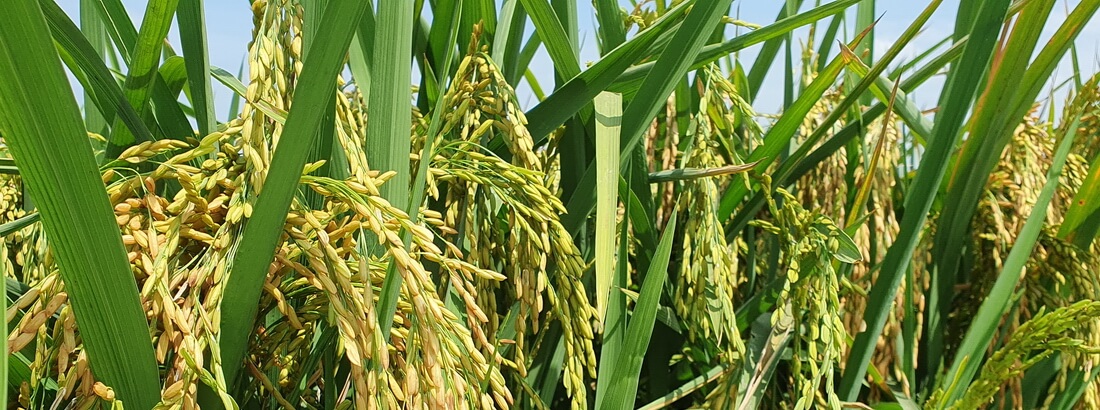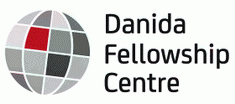Climate-resilient and eco-friendly rice for Africa
What if the future of African rice farming lies in ancient landraces, modern genetics, and smarter field practices?
Tough on climate, gentle on the planet: Our project, Climate-Resilient and Eco-Friendly Rice for Africa, is pioneering a new generation of rice cultivars - built to withstand floods, salinity, and drought while cutting methane emissions. Resilient for farmers, eco-friendly for the future.

We integrate plant, soil, environmental, and social sciences across three work packages. In drought-prone areas, we assess community vulnerability, land and water use, and farmers' varietal preferences using surveys, participatory tools, and stakeholder analysis. We phenotype 200 rice genotypes for drought tolerance and analyze root traits and drought-linked genes for breeding climate-resilient cultivars. We also test direct seeding and multiple harvest systems using diverse varieties, monitor greenhouse gas emissions under different irrigation regimes, and support eco-friendly practices via community trials, training, and seed networks.
Check out this news piece from the kick-off workshop in Kenya
Rice has become a staple food in much of Eastern and Southern Africa, driven by changing diets, population growth, and urbanization. Yet, the region’s rice production is struggling to keep up. Many farmers still rely on outdated, low-yielding varieties that are particularly vulnerable to drought – a risk that now threatens nearly 80% of rice-growing areas. And with climate change driving more extreme weather, the situation is likely to worsen.
But there's more at stake than just food supply. Flooded rice paddies are also significant sources of methane, a potent greenhouse gas. And within rural communities, particularly women—who make up a large share of smallholder farmers—often face unequal access to land, credit, and agricultural technologies.
Our project, Climate-Resilient and Eco-Friendly Rice for Africa, seeks to address these intersecting challenges. Through a collaborative effort spanning Kenya, Tanzania, Denmark, and the Philippines, we are working to build drought resilience, reduce greenhouse gas emissions, and promote equitable access to innovations in rice farming.
The project is organized into six integrated work packages that together address the technical, institutional, social, and policy challenges of climate-resilient and eco-friendly rice production in Eastern and Southern Africa.
WP1 examines how communities in Kenya and Tanzania respond to drought, mapping existing adaptation strategies and identifying vulnerable regions. 'Equity Ambassadors' will be appointed to ensure inclusive engagement. Baseline data on land, water, inputs, varieties, and institutions will guide context-specific interventions.
WP2 focuses on identifying drought-tolerant traits in African landraces and O. glaberrima, and introgressing these into locally preferred varieties using marker-assisted breeding. Genetic and phenotypic analyses will guide the development of elite lines suited to drought-prone areas.
WP3 evaluates direct seeding and multiple harvest systems as alternatives to conventional practices. Trials will assess varietal performance, farmer preferences, and impacts on water use and methane emissions, contributing to more sustainable rice production strategies.
WP4 builds institutional capacity through postgraduate training, infrastructure development, and regional collaboration. Facilities for drought screening will be upgraded, and training will emphasize inclusion and regional access to shared research resources.
WP5 ensures the dissemination of research findings to policymakers, extension services, and farmers. Outputs include policy briefs, training materials, field demonstrations, and support for seed producers. Findings from WP2 and WP3 will be integrated into national and regional strategies.
WP6 provides project coordination, financial oversight, and partner engagement. It ensures effective communication across the consortium, regular reporting, and transparent resource management through steering committee oversight and external audits.
At the heart of our work are three major knowledge gaps:
First, we need a better understanding of how communities—especially women-led households—are already adapting to drought. Which strategies have worked, and what barriers remain?
Second, we are exploring whether African landraces contain unique root traits that enhance drought tolerance. Could these traits be harnessed to improve modern, high-yielding varieties?
And third, while it’s known that rice varieties differ in methane emissions, we still don’t know why. We want to explore whether certain root traits—perhaps the same ones linked to drought tolerance—also reduce emissions, especially under climate-smart practices like alternate wetting and drying or multiple cropping (ratooning).
Building on a previous DANIDA-funded project on salinity and flood tolerance in Tanzanian rice, this new initiative expands the focus to include drought-prone regions in both countries. Our work falls into four interconnected objectives:
Addressing inequity: By understanding how communities cope with drought and focusing on the needs of marginalized groups — especially women — we aim to make rice farming more inclusive and equitable.
Developing drought-tolerant varieties: Using both traditional African landraces and modern breeding tools, we will introduce drought tolerance traits into popular, locally adapted varieties, ensuring high performance in tough conditions.
Implementing smart agronomy: Practices like direct seeding and ratooning will be tested and promoted. These not only save water but also reduce methane emissions—helping farmers adapt while also contributing to climate change mitigation.
Building institutional capacity: We will invest in research infrastructure, postgraduate training, and regional collaboration to support long-term, locally driven innovation in rice breeding and agronomy.
Kenya and Tanzania have been hit hard by recent droughts, and both are priority countries for Danish development cooperation. In Kenya, our work aligns with national goals of achieving food security and poverty reduction by 2030. In Tanzania, we support government strategies that view rice as a high-value crop with the potential to boost rural incomes.
Through strong partnerships with research institutions in both countries — including KALRO, TARI, and SUA — we aim to strengthen local capacity while generating regionally relevant solutions. The project directly contributes to global goals, including SDGs 1 (no poverty), 2 (zero hunger), 5 (gender equality), and 13 (climate action).
By the end of the project, we expect to see concrete benefits on the ground:
Stronger communities: With better knowledge, more inclusive technologies, and targeted support, drought-prone communities — especially women farmers — will be better equipped to withstand future climate shocks.
Better crops: High-yielding, drought-tolerant rice varieties tailored to local conditions will be available to farmers in Kenya and Tanzania, reducing crop losses and improving food security.
Sustainable farming: Through the adoption of direct seeding and multiple cropping, farmers will use less water and emit less methane, contributing to more environmentally friendly rice production.
Lasting impact: With improved research capacity and strong partnerships across the region, the project will leave behind institutions capable of driving innovation far beyond the project’s lifespan.
Our vision is simple but urgent: rice that can survive drought, support farmers — especially women — and protect the climate. Through science, training, and collaboration, "Climate-resilient and eco-friendly rice for Africa" aims to deliver on that promise.
Funded by:

Project: Climate-resilient and eco-friendly rice for Africa
Funding agency: Danida Fellowship Centre
Period: 5 years
Grant: DKK 10,000,000
Period: April 2025 to March 2030
Contact
Professor Ole Pedersen, PI
ORCID
Members of the consortium
| Name | Organisation | |
|---|---|---|
| Dr Abdel Ismail | International Rice Research Institute | |
| Dr Amelia Henry (WP 2 leader) | International Rice Research Institute | |
| Dr Atugonza Bilaro (WP 5 leader) | Tanzania Agricultural Research Institute | |
| Dr Beatrice Mwaipopo | Sokoine University of Agrculture | |
| Dr Emily Gichuhi (WP 5 leader) | Kenya Agriculture and Livestock Research Organisation | |
| Dr Emmanuel Malisa (WP 1 leader) | Sokoine University of Agrculture | |
| Dr Fitta Silo | International Rice Research Institute | |
| Dr Juan Jiménez | University of Copenhagen | |
| Dr Jummai Yila | International Rice Research Institute | |
| Dr Mawazo Shitindi | Sokoine University of Agrculture | |
| Dr Newton Kilasi | Sokoine University of Agrculture | |
| Dr Ole Pedersen (PI and WP 6 leader) | University of Copenhagen | |
| Dr Richard Madege | Sokoine University of Agrculture | |
| Dr Rosemary Murori (WP 3 leader) | International Rice Research Institute | |
| Dr Susan Nchimbi-Msolla (WP 4 leader) | Sokoine University of Agrculture |
